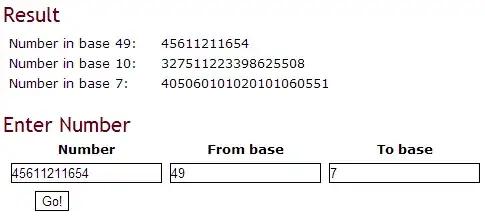First question
First case : $N_{p^n}$ has an even number of digits $2(m+1)$. Let
$$N_{p^n} = a_0a_1a_2a_3 \ldots a_{m-1}a_ma_ma_{m-1} \ldots a_3a_2a_1a_0$$
Let's transform $N_{p^n}$ to base $10$:
$$N_{p^n} = [a_0\cdot(p^n)^{2m+1}+a_1\cdot(p^n)^{2m}+a_2\cdot (p^n)^{2m-1}+\ldots + a_2\cdot (p^n)^{2} +a_1\cdot (p^n)^{1}+a_0 ]_{10}$$
And now turn the number obtained to base $p$, with the division method:
$$N_{p^n} = [a_0\cdot(p^n)^{2m+1}+a_1\cdot(p^n)^{2m}+a_2\cdot (p^n)^{2m-1}+\ldots + a_2\cdot (p^n)^{2} +a_1\cdot (p^n)^{1}+a_0 ]_{10} = $$
$$a_000 \ldots 00a_100 \ldots 00a_200 \ldots 00 \ldots a_m00 \ldots 00a_m \ldots a_200 \ldots 00a_100 \ldots 00a_0$$
which is a palindrome number. Note that in all the series of $0$s the digit "$0$" appears $n-1$ times. Actually this is the right representation of $N_{p^n}$ in base $p$, because $a_i < p$ $ \forall$ $ i $ $|$ $ 0 \leq i \leq m$, so when you divide the number by $p$ the reminder is $0$ or $a_i$. Furthermore the reminder is $0$ exactly $n-1$ times, because, once you get a reminder $a_i$, then the quotient is divisible by $p^{n-1}$ (and not by $p^{n}$). So when you reiterate the divisions you get a remainder $0$ for exactly $n-1$ operations and then you get a remainder of $a_{i+1}$.
Second case : $N_{p^n}$ has an odd number of digits $2(m+1)+1$. Let
$$N_{p^n} = a_0a_1a_2a_3 \ldots a_{m-1}a_ma_{m+1}a_ma_{m-1} \ldots a_3a_2a_1a_0$$
Let's do the same and let's convert $N_{p^n}$ to base $10$:
$$N_{p^n} = [a_0\cdot(p^n)^{2m+2}+a_1\cdot(p^n)^{2m+1}+a_2\cdot (p^n)^{2m}+\ldots +a_m\cdot(p^n)^{2m+2}+a_{m+1}\cdot(p^n)^{2m+1}+a_m\cdot(p^n)^{2m} + \ldots + a_2\cdot (p^n)^{2} +a_1\cdot (p^n)^{1}+a_0 ]_{10}$$
and similarly convert the number obtained to base $p$, we get:
$$N_{p^n} = [a_0\cdot(p^n)^{2m+2}+a_1\cdot(p^n)^{2m+1}+a_2\cdot (p^n)^{2m}+\ldots +a_m\cdot(p^n)^{2m+2}+a_{m+1}\cdot(p^n)^{2m+1}+a_m\cdot(p^n)^{2m} + \ldots + a_2\cdot (p^n)^{2} +a_1\cdot (p^n)^{1}+a_0 ]_{10} = $$
$$a_000 \ldots 00a_100 \ldots 00a_200 \ldots 00 \ldots a_m00 \ldots00a_{m+1}00\ldots 00a_m \ldots a_200 \ldots 00a_100 \ldots 00a_0$$
and we followed the same reasoning as in the first case, so the $0$s are always $n-1$ and we obtained a palindrome number too (see previous case for better explanation).
$Q.E.D$
Second question
As you can imagine if $N_{p^n}$ and $N_{p}$ are both palindrome, then $p$ must be any prime. Unfortunately your conjecture holds only for prime numbers, and not in general.
